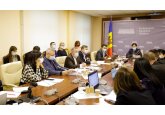
The government supported the introduction of a moratorium on the issuance of permits for the construction of new filling stations and tougher sanctions for violations of regulations on the oil product market.
At a meeting on Wednesday, the Cabinet of Ministers gave a positive conclusion to the bill on amendments to a number of regulations concerning the activities of operators of the oil products market. The bill provides for the following measures: introduction of a moratorium on the construction of new filling stations; the abolition of the fixed fee for the import and wholesale trade license in the amount of 260 thousand lei per year; an increase in the size of fines for oil companies for violation of legislation in this area; a ban on the wholesale resale of petroleum products. In particular, it was proposed to establish a 6-month moratorium on the issuance of urban planning certificates for the design of new filling stations with basic oil products and liquefied gas filling stations (except for cases related to the reconstruction, re-equipment and modernization of existing filling stations). It is also proposed to abolish the fixed license fee, which currently amounts to 260 thousand lei for imports, and to apply a general license fee of 3 250 lei. This measure follows the uneven application of license fees for the import and wholesale of gasoline / diesel and liquefied gas. At the same time, the bill provides for the introduction of a tax in the composition of excise taxes on imports of petroleum products, its size will be 10 lei per ton. This will facilitate the access of new operators to the wholesale fuel market and the equality of all market participants in relation to the state, which licenses this entrepreneurial activity. In order to exclude the emergence of intermediaries in the market and reduce the risk of smuggling, it was proposed to prohibit the wholesale resale of petroleum products. In addition, the bill provides for a number of amendments to the Code of Violations and a 10-fold increase in fines for violations in the oil products market. For example, if today a fine from 4.5 thousand to 6 thousand lei can be imposed on a legal entity for violation of the rules for storing petroleum products, then after the entry into force of the bill the amount of sanctions will be from 45 thousand to 60 thousand lei. The authors of the bill propose that the bill enter into force 6 months after publication in Monitorul Oficial, with the exception of the moratorium, which will enter into force from the moment of publication of the law, as well as a number of provisions that may come into force on January 1 of the following year. The government supported the bill as a whole, but proposed a number of amendments. The document must be approved by the parliament. // 08.12.2021 - InfoMarket







